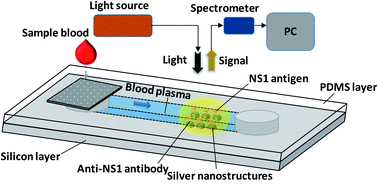LSPR based on-chip detection of dengue NS1 antigen in whole blood
Abstract
The development of a biosensor for rapid and quantitative detection of the dengue virus continues to remain a challenge. We report a lab-on-chip device that combines membrane-based blood plasma separation and a localized surface plasmon resonance (LSPR) based biosensor for on-chip detection of dengue NS1 antigen from a few drops of blood. The LSPR effect is realized by irradiating UV-NIR light having a spectral peak at 655 nm onto nanostructures fabricated via thermal annealing of a thin metal film. We study the effect of the resulting metal nanostructures on the LSPR performance in terms of sensitivity and limit of detection, by annealing silver films at temperatures ranging from 100 to 500 °C. The effect of annealing temperature on the nanostructure size and uniformity and the resulting optical characteristics are investigated. Further, the binding between non-targeted blood plasma proteins and NS1-antibody-functionalized nanostructures on the LSPR performance is studied by considering different blocking mechanisms. Using a nanostructure annealed at 200 °C and 2X-phosphate buffer saline with 0.05% Tween-20 as the blocking buffer, from 10 μL of whole blood, the device can detect NS1 antigen at a concentration as low as 0.047 μg mL−1 within 30 min. Finally, we demonstrate the detection of NS1 in the blood samples of dengue-infected patients and validate our results with those obtained from the gold-standard ELISA test.



 Please wait while we load your content...
Please wait while we load your content...